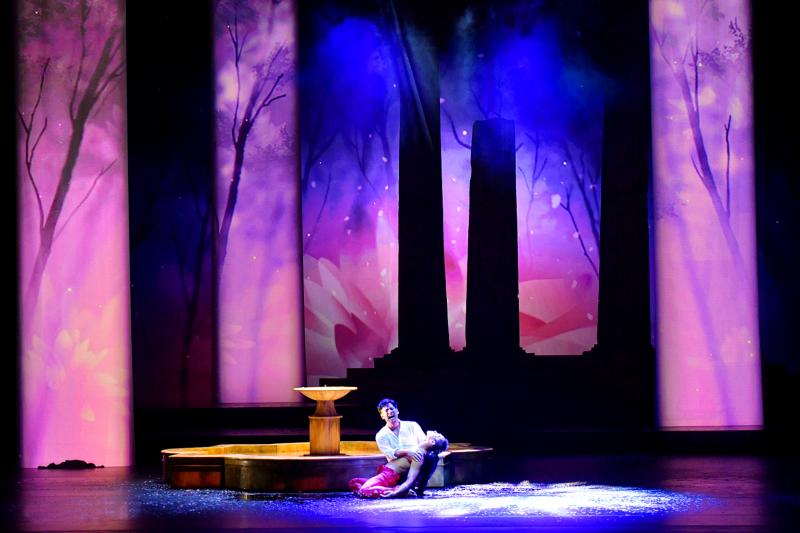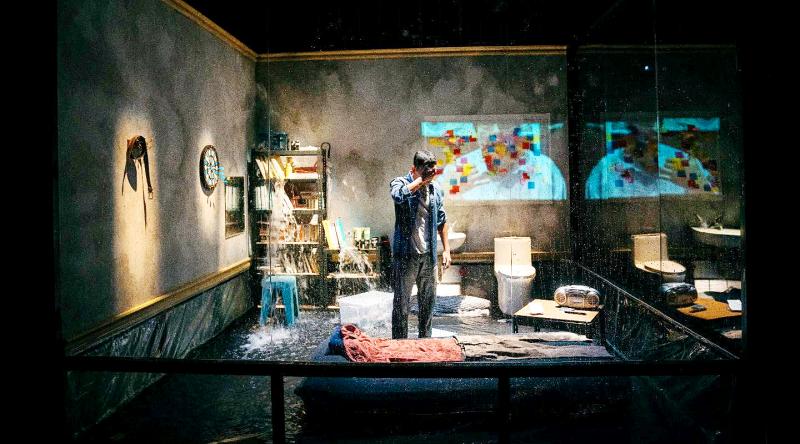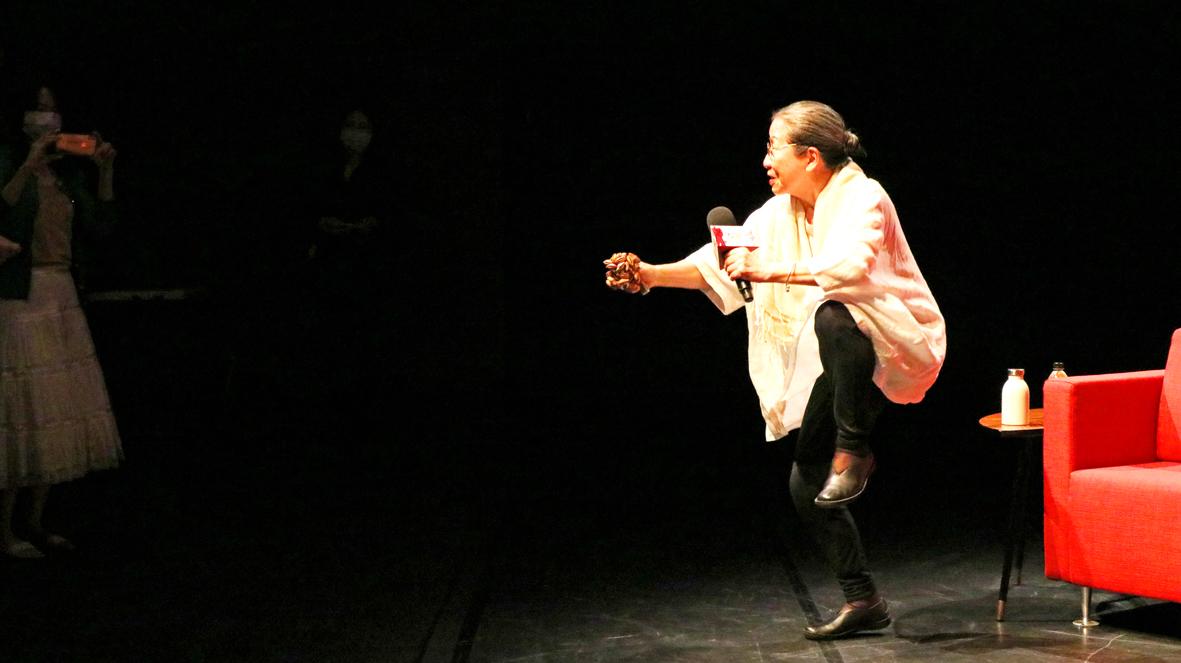The National Taichung Theater’s annual “Fall for Great Souls” this year was programmed around three main themes: “Being,” “Soul” and “Core,” featuring an intriguing mix of imported and local productions.
However, due to the travel restrictions imposed in the wake of the COVID-19 outbreak, it lost three of the shows scheduled for December: the Belgian theater collective STAN’s production of Anton Chekov’s The Cherry Orchard, Le Fils du Grand Reseau Theatre Company’s Fishbowl and Theatre de l’Entrouvert’s Anywhere.
Those three made up the “Core” portion of the series, but even without that core, the remaining programs are an fascinating mix of new shows and revivals of some much loved works by Taiwanese artists and groups.

Photo courtesy of Hsu Pei-hung
The “Being” portion features works by four masters of their genres: famed opera singer and director Tseng Dau-hsiong’s (曾道雄) Fala double bill El Amor Brujo and La Vida Breve, which opened the series last weekend; a revival of the stage production of Kenneth Pai’s (白先勇) Crystal Boys (孽子); a revival of Legend Lin Dance Theatre (無垢舞蹈劇場) founder Lin Lee-chen’s (林麗珍) Anthem to the Fading Flowers (花神祭春芽); and South Korean pianist Paik Kun-woo, who will perform all 32 works in the Beethoven Piano Sonata Cycle over the course of eight shows starting on Dec. 16.
The “Soul” segment features Wonderful (如此美好), a two-man play by NTT’s first artist-in-residence, playwright/actor Daniel Wang (王靖惇); the Taiwanese opera company Ming Hwa Yuan Arts & Cultural Group’s (明華園戲劇總團) classic The Khun Island (鯤鯓平卷); and Cloud Gate Dance Theatre’s (雲門舞集) new work by artistic director Cheng Tsung-lung (鄭宗龍), Sounding Light (定光).
The final “Soul” segment is the National Symphony Orchestra’s (國家交響樂團) staging of German director Andreas Homoki’s contemporary take on Puccini’s La Boheme at the end of December.

Photo courtesy of the National Taichung Theater
‘CRYSTAL BOYS’

Photo courtesy of the National Taichung Theater
This year marks the 40th anniversary of the publication of Pai’s Crystal Boys, which was one the earliest literary works dealing with LGBT issues in Taiwan and is now widely recognized as a seminal work of Chinese gay literature.
It was adapted into a movie, a TV drama and, in 2014, a stage version commissioned by the National Theater Concert Hall opened that year’s Taiwan International Festival of the Arts, produced by the Creative Society (藝碩文創) and directed by Cao Ruei-yuan (曹瑞原), who had directed the television series.
Pai said that reviving the play this year was significant, given the government’s legalization of same-sex marriage in May last year.
The revival, which features an all-star cast drawn from theater, television, dance and pop music, had been set to open at the National Kaohsiung Center for the Arts in March, but those shows were canceled when the government imposed audience number restrictions on theaters.
However, the easing of those restrictions in June meant the show could finally open in Kaohsiung last weekend, and then Taichung tomorrow for the first of two performances, before moving on to the National Theater in Taipei for three more shows starting on Oct. 16.
Crystal Boys, set in 1960s Taipei, follows the story of Li Qing (李青), who is expelled from school and ostracized by his father when he is discovered to be a homosexual.
Li starts hanging out at New Park (新公園) — now the 228 Peace Memorial Park (22八和平紀念公園) — and meets a variety of characters from Taipei’s gay subculture.
The story is about their father-son relationship, but also reflects the disparities and conflicts between two generations, and between social values and the individual.
The play runs three hours and 20 minutes, including a 20-minute intermission, and is performed in Mandarin and Taiwanese with Chinese surtitles.
It comes with an audience advisory that the program contains homosexual and adult themes, violence and partial nudity.
This story has been updated since it was first published.

June 2 to June 8 Taiwan’s woodcutters believe that if they see even one speck of red in their cooked rice, no matter how small, an accident is going to happen. Peng Chin-tian (彭錦田) swears that this has proven to be true at every stop during his decades-long career in the logging industry. Along with mining, timber harvesting was once considered the most dangerous profession in Taiwan. Not only were mishaps common during all stages of processing, it was difficult to transport the injured to get medical treatment. Many died during the arduous journey. Peng recounts some of his accidents in

A short walk beneath the dense Amazon canopy, the forest abruptly opens up. Fallen logs are rotting, the trees grow sparser and the temperature rises in places sunlight hits the ground. This is what 24 years of severe drought looks like in the world’s largest rainforest. But this patch of degraded forest, about the size of a soccer field, is a scientific experiment. Launched in 2000 by Brazilian and British scientists, Esecaflor — short for “Forest Drought Study Project” in Portuguese — set out to simulate a future in which the changing climate could deplete the Amazon of rainfall. It is

What does the Taiwan People’s Party (TPP) in the Huang Kuo-chang (黃國昌) era stand for? What sets it apart from their allies, the Chinese Nationalist Party (KMT)? With some shifts in tone and emphasis, the KMT’s stances have not changed significantly since the late 2000s and the era of former president Ma Ying-jeou (馬英九). The Democratic Progressive Party’s (DPP) current platform formed in the mid-2010s under the guidance of Tsai Ing-wen (蔡英文), and current President William Lai (賴清德) campaigned on continuity. Though their ideological stances may be a bit stale, they have the advantage of being broadly understood by the voters.

Artifacts found at archeological sites in France and Spain along the Bay of Biscay shoreline show that humans have been crafting tools from whale bones since more than 20,000 years ago, illustrating anew the resourcefulness of prehistoric people. The tools, primarily hunting implements such as projectile points, were fashioned from the bones of at least five species of large whales, the researchers said. Bones from sperm whales were the most abundant, followed by fin whales, gray whales, right or bowhead whales — two species indistinguishable with the analytical method used in the study — and blue whales. With seafaring capabilities by humans